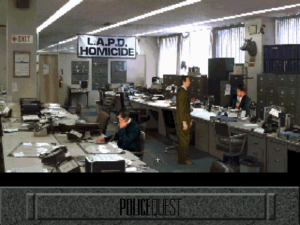Police Quest 4
 I dropped out of Sierra’s Police Quest series after its second episode, playing the third only after the series was anthologized years later. PQ1 was a must-have item for me on its initial release, not because I’m a particular fan of cop dramas, but simply because Sierra-style adventures were scarce in those days. Sierra’s adventures were often badly-designed, usually goofier than intended, given to amateurish prose and misused words, but I was willing to forgive a lot to get my fix while they were the only game in town. Even today, launching this game and seeing the old familiar SCI-era Sierra logo animation gives me a little warm fuzzy feeling. But you’ll find a lot more people today with fond memories of the old Lucasarts adventures than of the Sierra ones, and it’s basically because Lucasarts had some actual writers on staff, and possibly even proofreaders. The designer of the first three Police Quest games, Jim Walls, apparently got the job by being a friend of the company founder; he had fifteen years of experience as a cop, and zero years as a writer or game designer. (And this from a company that had made games for the likes of Disney and Jim Henson.)
I dropped out of Sierra’s Police Quest series after its second episode, playing the third only after the series was anthologized years later. PQ1 was a must-have item for me on its initial release, not because I’m a particular fan of cop dramas, but simply because Sierra-style adventures were scarce in those days. Sierra’s adventures were often badly-designed, usually goofier than intended, given to amateurish prose and misused words, but I was willing to forgive a lot to get my fix while they were the only game in town. Even today, launching this game and seeing the old familiar SCI-era Sierra logo animation gives me a little warm fuzzy feeling. But you’ll find a lot more people today with fond memories of the old Lucasarts adventures than of the Sierra ones, and it’s basically because Lucasarts had some actual writers on staff, and possibly even proofreaders. The designer of the first three Police Quest games, Jim Walls, apparently got the job by being a friend of the company founder; he had fifteen years of experience as a cop, and zero years as a writer or game designer. (And this from a company that had made games for the likes of Disney and Jim Henson.)
But PQ4 isn’t by Walls. By this point, Sierra had enough clout to get a famous non-writer: Daryl Gates, recently-retired chief of the Los Angeles Police Department. Gates presided over the the controversial transformation of the LAPD into a paramilitary force, a period that most of America remembers primarily as the Rodney King era. I’ve tried to avoid getting into politics on this blog, but it’s impossible to play this game without thinking of the man behind it. I find myself unavoidably watching for glimpses of the alleged racism and brutality that he’s no doubt scrupulously avoided giving any hint of here. It’s like looking at Hitler’s paintings.
But so far, the primary sense I get is simply one of goofiness and amateurish prose, a crime thriller by a wannabe writer. A body is described as “strewn” in a dumpster. The voice actors, obviously recorded in separate sessions, valiantly do their best with unnatural exposition. The narrator is just confusing: he addresses the player character, an experienced homicide detective, by name, but keeps reacting to player actions by explaining basic principles of police work, as if addressing a raw recruit. (This would have worked better as the PC’s inner voice, I think.) The graphics are all photographic, which makes this a work of proto-FMV, and it’s easy to think of this as related to the lack of polish in early FMV-based titles.
 Comments(2)
Comments(2)
I guess a vote can make a difference ;-)
The voiceover in this game is hilariously terrible.